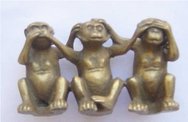|
1/22/2013 0 Comments How Cold Is It? The United States' upper Midwest has been feeling the winter's chill over the last few days. Enough so that certain idioms and colloquialisms have been shared, in an attempt to describe or quantify just how cold it has been. This, naturally, gets the Writers and Polishers to wondering at the source(s) of some of these phrases. Being that information has never been easier to acquire than in the Internet age, we looked into a couple of the more common. We now share our findings with you: The poor brass monkey Since 1857, the brass monkey has been afflicted by cold, such as would freeze his tail off. This was the first such recorded use, in Before the Mast (by C.A. Abbey). Interestingly, exactly a decade prior, Herman Melville assigned a phrase to a character in Omoo asserting that "It was 'ot enough to melt the nose h'off a brass monkey." Variously, excessive heat or cold has been said to cost the poor brass monkey his ears, nose, whiskers, throat, tail or fur, as well as other, less appropriate bits of the monkey's anatomy, which first appear in the written record by the 1930s.
And, the witch's bosoms?
In the matter of using a witch's tit (or teat) as a yardstick for the cold, what's clear is what is not the colloquial source of the phrase. Contrary to popular belief that it is a vestige of witch-hunting centuries past, in which some stray bit of flesh could be used to convict a woman of consorting, and possibly engaging in unholy congress, with Old Scratch, the phrase first appears in the written record in <drumroll> 1932. Yes, you read that correctly. Again, the esteemed experts at the OED have been unable to turn up any use of the phrase prior to that year, when F. Van Wyck [pronounced "Wike"] Mason employed it in his novel, Spider House. While it is generally accepted that such terms are probably being used in conversation before someone writes them down, it nonetheless beggars belief that it could have existed for four or six or eight centuries without a surviving written reference prior to Mr. Mason. As such, it seems that it was coined by a person and with an intent now lost to memory, but in the relatively recent past, and probably as a straight-up metaphor.
0 Comments
Leave a Reply. |
Write and Polish BloggersChristie Manussier, principal Writer and Polisher, is the usual news reporter. CategoriesAll Abbreviation Academic Acronym Adjective Adverb Anachronism Anagram Apostrophe Application Article Banished Biography Blend B.N.I. Boldface Brochure Bunnies Business Business Plan Capitalization Children's Literature Christmas Church Comma Common Mistakes Construction Contact Management Content Contest Cross-sell Databse Differentiators Donation Double Negative E-mail Entertainment Etymology Event Coordination File Format First Reference Flyer Fundraiser Giggles Gold Star Grammar Day Grant Proposal Haiku Health Care Homophones Hyphen Idiom Images Italics Law Firm Magazine Manual Marketing Maternity Leave Metaphor Myth News & Announcements Newsletter Non Profit Non-profit Noun Numbers Of Snakes And Presidents Parts Of Speech P.D.F. Plural Poetry Portmanteau Poster Powerpoint P.R. Preposition Press Release Projects Pronoun Proofreading & Editing Punctuation Quotation Marks Quotes Real Estate Recommended Reading Reflexive Research Resources Restaurant Retail R.F.P. R.I.P. Shakespeare Slideshow Social Media Spelling Style Manual Synonyms Syntax Template Tenses Testimonial Thesaurus Training Manual Translation Travel Twitter Underlining Verb Video Vocabulary Website Why The World Needs More Proofreaders Winter Word Of The Day Writers Writing Tip Archives
March 2015
|
Search by typing & pressing enter


 RSS Feed
RSS Feed